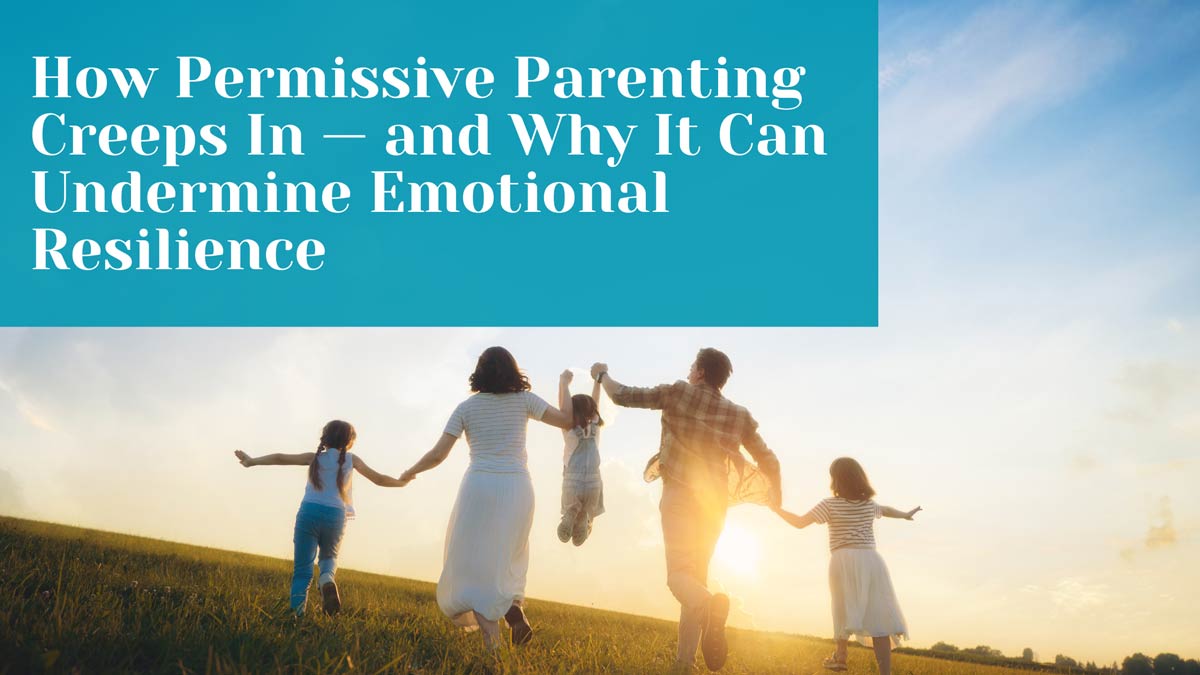How Permissive Parenting Creeps In — and Why It Can Undermine Emotional Resilience

As a therapist in San Diego, I often work with overwhelmed parents who find themselves saying “yes” too often or avoiding conflict just to get through the day. These decisions usually come from a place of love and survival—not neglect. But over time, they can interfere with a child’s ability to develop emotional resilience.
My most recent blog and social media series covering the topic of boundaries was inspired by my own family’s struggles with being permissive too often. We had to engage in a total reset, which was incredibly helpful for all of us though our son certainly had his complaints. I though it might be helpful to share more about how these permissive parenting challenges develop and my reflections about the impact on children’s development.
- Giving in to tantrums or emotional outbursts to avoid a scene
- Skipping consequences to preserve peace
- Avoiding “hard” parenting moments out of guilt or exhaustion
This parenting style isn’t rooted in apathy—it’s often rooted in fatigue. When you’re racing between work meetings and soccer practice, enforcing bedtime or screen-time limits can feel like a battle you just don’t have the energy for.
1. Time Pressure
When there’s no time for a meltdown, it’s tempting to take the path of least resistance. But repeated “yeses” in the name of speed or ease can add up to unclear limits.
2. Emotional Fatigue
After a long day, many parents just want peace and quiet. Saying “yes” may feel like the only way to restore calm—even when it compromises your long-term parenting goals. It can also creep in if you have a strong-willed child (like ours!) where the constant arguing leads you to say yes to have some peace and calm in your home.
3. Guilt & Empathy Misfires
Empathy is essential in parenting, but if it leads to rescuing children from any distress, they miss opportunities to learn how to cope with life’s inevitable frustrations.
- Lower frustration tolerance
- Difficulty regulating emotions independently
- Heightened reactivity
- Fewer problem-solving skills
As a CBT therapist in San Diego, I often work with families to build resilience skills. Cognitive Behavioral Therapy (CBT) emphasizes the connection between thoughts, emotions, and behaviors—teaching both parents and children how to cope more effectively with discomfort and emotional challenges.
1. Pause Before Reacting
Taking a breath before responding to an emotional outburst can give you the space to choose a more intentional, values-based response.
2. Set Boundaries with Compassion
You can hold a limit and validate the emotion. For example: “I know you’re upset we can’t go to the park. It’s okay to feel disappointed. Let’s find something else to do together.”
3. Be Consistent
Consistency builds predictability—and with it, security. Children feel safer when they know what to expect.
4. Coach, Don’t Rescue
Help your child understand their feelings rather than trying to “fix” them. “You’re feeling frustrated because this is hard. That’s normal. Let’s talk about how to work through it.”
5. Prioritize Your Own Mental Health
Parents need support too. Whether it’s your own therapy, a support group, or simply carving out rest, your ability to show up consistently improves when you’re cared for, too.
Need help getting started? Our team of therapists and psychologists in San Diego is here to support you. Reach out to learn more about CBT therapy in San Diego and how we can help your family thrive.
Reach out to start
your healing journey

